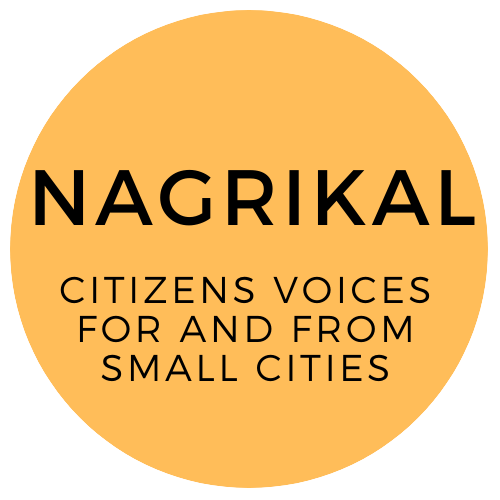Winning Essay: Nagrika Spring 2020 Essay Competition
/This is the winning entry of the Nagrika Essay Competition held in April 2020.
About the winner: Ayushi is a resident of a small town called Junga in Shimla District from Himachal Pradesh in India. She is currently pursuing her graduation from Miranda House, University of Delhi. She is chirpy, talkative and highly passionate about bringing a positive change in society. Her hobbies are painting, reading, dramatics and debating.
Resilient Futures, Sustainable Cities
“What is the city but the people?”
~William Shakespeare
Hustle-bustle of people, bright sparkling lights, skyscrapers, pish-posh markets, glamorous nightlife, manifold vehicles etc. usually characterize our imagination of a city. But a city is much more than that, with the most distinct feature of its abode being humans themselves. By 2050, the world’s population is expected to reach 9.8 billion. Nearly 70 percent of this booming population—6.7 billion people— is projected to live in urban areas. This has a subtle advisory to it. It also means that with increasing population flanking the cities, there are chances of increased urban problems for the residents. Which brings us to these pertinent questions- What should we, as a civilization do to ensure the lessening or annihilation of these problems? Will we be able to solve these problems, or not? Will there be a better life ahead? These questions invariably lead us to examine another intricately tied broader question of- “What would our city look like in 2050?”
“My future city ensures strengthened grass-root democracy, with more real constitutionally delegated power to cities, to deal with the problems that affect them and their people.”
Examining the above-mentioned question not only leads us to broaden our horizons to think about the various possibilities of the future of the cities we currently inhabit but also makes us pitch in our hopes and aspirations so as to “how” we would like the future cities to be. One account of the future was also presented by George Orwell, in his book “1984”, of a dystopian society centering around the consequences of governmental overreach. However, my vision of the future city is not nightmarish and it builds around democracy and its ideals where real citizen participation is ensured, with proper liberty and equality guaranteed. For this I believe its essential that my future city ensures strengthened grass-root democracy, with more real constitutionally delegated power to cities, to deal with the problems that affect them and their people. Community participation in the political process in more real terms than it is today, is an intrinsic part of it.
One common problem that every city in the world is facing right now is that of climate change and global warming, with disastrous consequences. One of them being- outbreak of many diseases, with the most recent COVID-19, which has brought the whole world to a standstill. So, if the future city does exist, then it would imbibe the principles of sustainable development with utmost sincerity and in every aspect of life, because only then can its continued survival be guaranteed. Not only will our city be greener and less polluted, but would also not make a compromise between environment and development. Usage of renewable energy, efficient water conservation like rainwater harvesting, protecting wildlife habitat and natural resources, green buildings, green technology, proper waste disposal, efficient usage of waste etc. would characterize it.
Plato said a long time ago, “Any city however small, is in fact divided into two, one the city of the poor, the other of the rich. These are at war with one another.” It continues to hold true, even today. The future city would however be characterized by equality, where no poverty exists and the gap between the rich and the poor is minimized. Considering the efforts of various international and domestic organisations, people and the government to ensure the removal of poverty and to cater to the basic needs of the people, the future does seem bright or atleast better than what it is today.
The cities of India also face many social evils, with most apparent being the caste system. In 2050, as per my desire there would be no discrimination against people on the basis of caste in any form as envisaged by the constitution of India in my city, with complete abolition of manual scavenging. I would inhabit a city where the tribals are given their rights and considerable autonomy to manage their own affairs and would not be forced into being a part of the typical city life we all are a part of. Tribals and non-tribals would live in peace and harmony. It would also be highly desirable if the feeling of communalism totally parishes and the values of secularism and fraternity as envisaged by our constitution makers seeps into the soul of every inhabitant of the city and the related evils of lynching, violence, discrimination etc. disappear altogether.
Urban problems like congestion, scarcity of water, unavailability of proper roads, no proper disposal of waste, shortage of food, no proper housing facilities, unavailability of primary healthcare to all etc. which are very much existing in today’s cities, do not feature in my vision of the city of 2050. My city would be ridden of all these problems with proper infrastructure, which is climate and disaster resilient and ensures sustainability. Proper healthcare for all would be ensured. No beggars would flank the streets of the city. No tumbled down buildings or slums would exist. Stray animals would be given proper rehabilitation. Sex workers working in the city would be given proper rights and protection. There should be pervasive equality with rights for LGBTQAI guaranteed. With sustainability ensured, the extremely apparent water problem would also be solved.
“In my vision of the future nobody should die of hunger and malnutrition, there would be measures for extensive organic farming, scientific agricultural practices, sustainable agriculture and produce would be locally sourced. ”
With the increase in the population by 2050, their demands of food consumption would also have to be met. In my vision of the future nobody should die of hunger and malnutrition, there would be measures for extensive organic farming, scientific agricultural practices, sustainable agriculture and produce would be locally sourced. Farmers should deservingly get paid enough for their produce. In the wake of increased population, there would be increased employment opportunities for all, in all the fields.
Sheryl Sandberg once said, “In the future, there will be no female leaders. There will be just leaders.” This holds true for my vision of future city, where women empowerment isn’t a dream anymore; where women are given equal pay for equal work; where their views and opinions are respected like any other’s; where they hold positions of power in every sector; where the crimes against women are at the lowest; where there’s equality, the much needed equality.
India, as we all know, is a diverse country. In the future where science in all its constructive capacity will make the lives of people easier; where technology will boom, but in a sustainable manner; where mobility of people due to efficient transportation would be exceptional; my vision entails a city where in the midst of all this, the unique diversity and culture of our country and its cultural life is appreciated, upheld, celebrated and sustained. Along with it, Gandhian ideals of self-reliance, truth, sustainability and non-violence should remain an inherent part of our heritage and the lifestyle of my fellow residents of the future city. Globalization as a phenomenon should not percolate so much so that the distinct culture and heritage of my country is forgotten. It should survive in all its magnanimity.
Last but not the least-basic, universal and proper education will not only facilitate all the above-mentioned aspirations for the future city, but would also characterize it. Education only can give way to highly determined leaders and government to facilitate the necessary changes which can make the lives of people better than what it is today. Education will also create a highly aware and alert citizenry to facilitate an extremely important process of good governance.
In conclusion, it would be appropriate to point out that it’s understandable, considering the situations that are prevalent around us, that realization of all the above-mentioned aspirations by 2050 might seem like a far-off reality or a utopia. It’s true, however, that I would want to inhabit a city like the one which I have already described in the preceding paragraphs and I hope that my city in 2050 is similar to what I have described. There’s a saying- “shoot for the stars and even if you miss, you’ll land on the moon” and I seem to be relying on it, hoping to ensure a better life for all.
In the end, I quote a self-composed poem on the same:
Aren’t we all born
without getting to decide where and when?
We usually conform
to the surroundings where we initially commence.
We expect a better life
beautiful as Goddess Aphrodite
One where we all strive
for the better of the society.
Fellow citizens- compassionate and kind
Sustainability in all walks of life
Environment and economy intertwined
only way for life to survive and thrive.
The dictum of Liberty and Equality
inherent in any real Democracy
Builds up hope for humanity
even in times of changing demography.
It’s Hercules’ labour to list down
all that we want to take-out
From our abodes, our own towns
though poverty is one of them, beyond reasonable doubt.
The unkept promises of the Constitution
have to be fulfilled
It’s a forgone conclusion
for a resilient future to build.
Aren’t I born in a city
with hopes and aspirations?
Will they be fulfilled by 2050?
ever? Or will I just die with expectations?”
This piece is part of Nagrikal, a platform for citizens from small cities to share their experiences so that they be channeled into policies.


